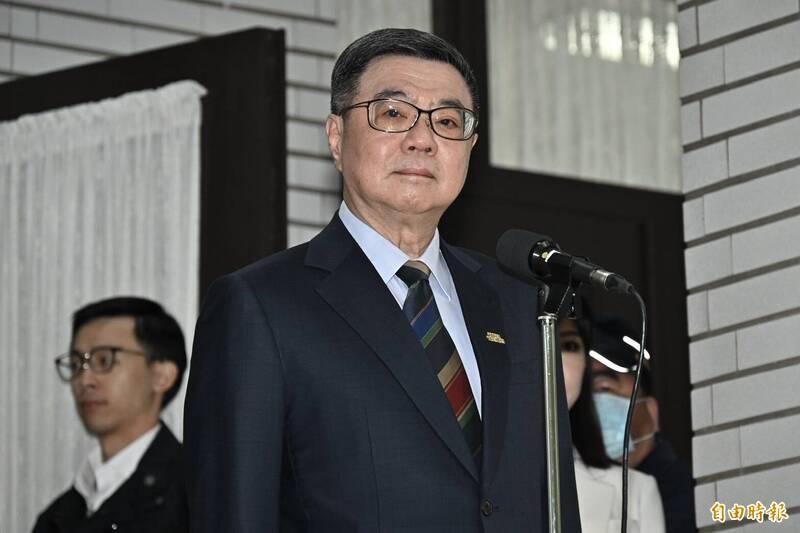The Executive Yuan is to request the legislature to reconsider the government budget bill and the fiscal law amendment bill after seeking approval from the president, Premier Cho Jung-tai (卓榮泰) said today.
Cho said the Executive Yuan would not be requesting a review if the bills would not make it difficult for the government to implement policies, disrupt its five branches and violate procedural justice.
The bills would destroy the nation’s constitutional system, contravene the principle of separation of powers, violate the public’s basic rights, undermine democracy and the rule of law, weaken the nation’s fiscal stability and make it difficult for the government to allocate funds, said Cho.

Photo: Tu Chien-jung, Taipei Times
The central government is willing to talk to the local governments to come up with a reasonable and sustainable version of the fiscal law, he said.
The Legislative Yuan last week submitted this year’s central government budget bill and its review to the Executive Yuan for promulgation.
It was reported that the content of the review appeared to be the same as the original bill and still does not specify the exact amounts of budget cuts and freezes.
The bill was submitted alongside amendments to the Act Governing the Allocation of Government Revenues and Expenditures (財政收支劃分法) that were passed on Dec. 20 last year.
That amendment would allocate 40 percent of the nation’s total taxation and other revenue to local governments, up from 25 percent. The remaining 60 percent is to be retained by the central government.
This year’s budget is the highest in recent years, Chinese Nationalist Party (KMT) Chairman Eric Chu (朱立倫) said.
If the Executive Yuan thinks it is not enough, it should propose an additional budget, Chu said, adding that Cho should deliver a report in the legislature and debate the issue with legislators.
Amendments to the fiscal law have been proposed by the KMT and the Democratic Progressive Party for a long time, he said, adding that the aim is to allocate a reasonable amount of funding to local governments.
The opposition would discuss and reject the Executive Yuan’s request lawfully, KMT caucus deputy secretary-general Wang Hung-wei (王鴻薇) said.
This revote is doomed to fail, she said.
Additional reporting by Hsieh Chun-lin and Sam Garcia

CHANGING LANDSCAPE: Many of the part-time programs for educators were no longer needed, as many teachers obtain a graduate degree before joining the workforce, experts said Taiwanese universities this year canceled 86 programs, Ministry of Education data showed, with educators attributing the closures to the nation’s low birthrate as well as shifting trends. Fifty-three of the shuttered programs were part-time postgraduate degree programs, about 62 percent of the total, the most in the past five years, the data showed. National Taiwan Normal University (NTNU) discontinued the most part-time master’s programs, at 16: chemistry, life science, earth science, physics, fine arts, music, special education, health promotion and health education, educational psychology and counseling, education, design, Chinese as a second language, library and information sciences, mechatronics engineering, history, physical education

The Chinese military has boosted its capability to fight at a high tempo using the element of surprise and new technology, the Ministry of National Defense said in the Quadrennial Defense Review (QDR) published on Monday last week. The ministry highlighted Chinese People’s Liberation Army (PLA) developments showing significant changes in Beijing’s strategy for war on Taiwan. The PLA has made significant headway in building capabilities for all-weather, multi-domain intelligence, surveillance, operational control and a joint air-sea blockade against Taiwan’s lines of communication, it said. The PLA has also improved its capabilities in direct amphibious assault operations aimed at seizing strategically important beaches,

New Taipei City prosecutors have indicted a cram school teacher in Sinjhuang District (新莊) for allegedly soliciting sexual acts from female students under the age of 18 three times in exchange for cash payments. The man, surnamed Su (蘇), committed two offenses in 2023 and one last year, the New Taipei District Prosecutors’ Office said. The office in recent days indicted Su for contraventions of the Child and Youth Sexual Exploitation Prevention Act (兒童及少年性剝削防制條例), which prohibits "engaging in sexual intercourse or lewd acts with a minor over the age of 16, but under the age of 18 in exchange for

The High Prosecutors’ Office yesterday withdrew an appeal against the acquittal of a former bank manager 22 years after his death, marking Taiwan’s first instance of prosecutors rendering posthumous justice to a wrongfully convicted defendant. Chu Ching-en (諸慶恩) — formerly a manager at the Taipei branch of BNP Paribas — was in 1999 accused by Weng Mao-chung (翁茂鍾), then-president of Chia Her Industrial Co, of forging a request for a fixed deposit of US$10 million by I-Hwa Industrial Co, a subsidiary of Chia Her, which was used as collateral. Chu was ruled not guilty in the first trial, but was found guilty